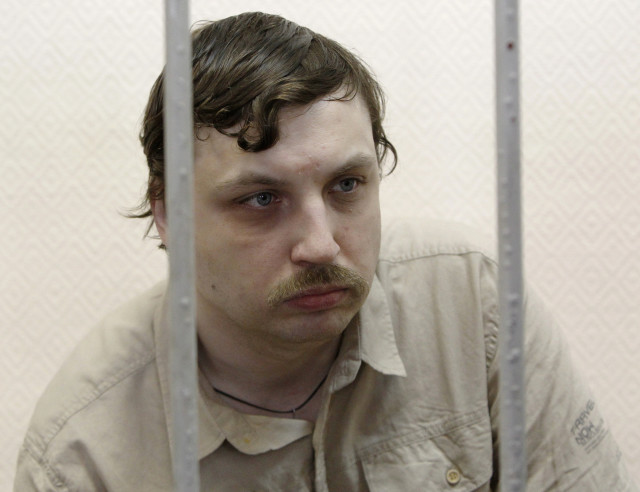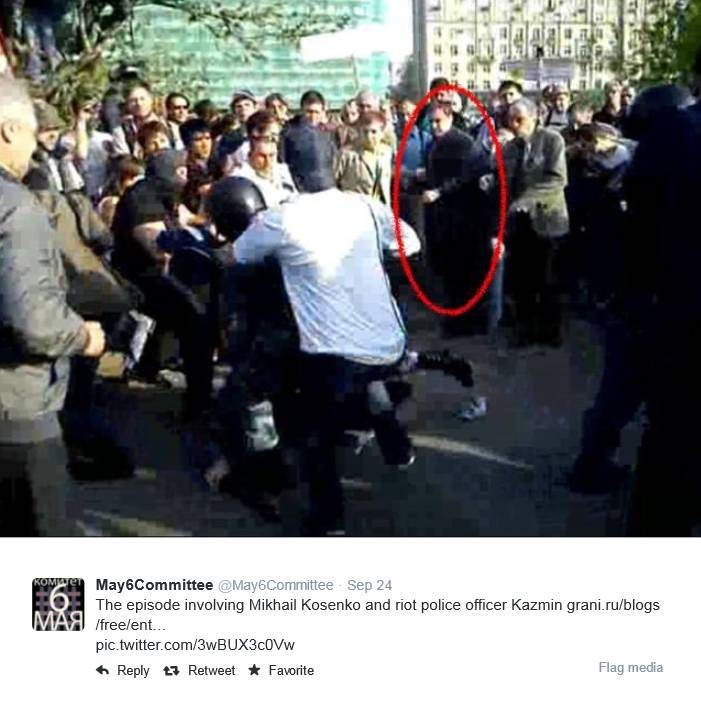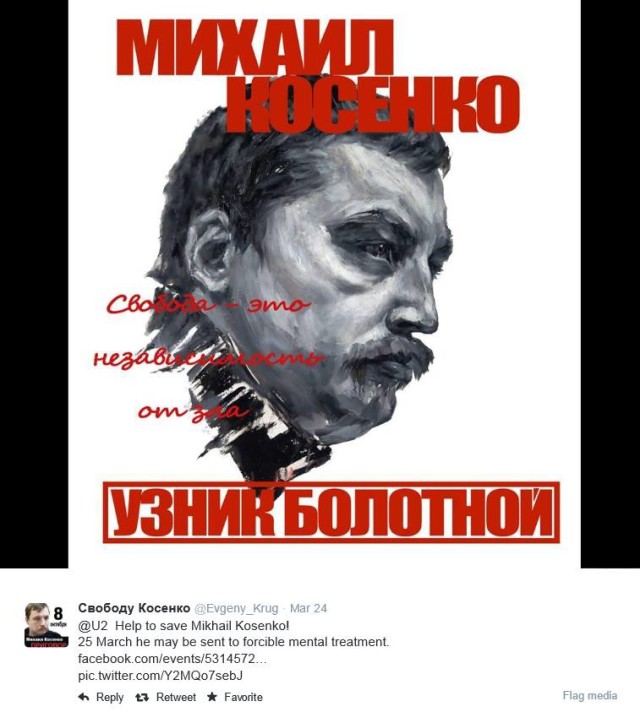
Mikhail Kosenko sits inside a defendants’ cage during a court hearing in Moscow May 29, 2013. A Russian court on Tuesday ordered Kosenko, a critic of President Vladimir Putin confined to a psychiatric ward indefinitely over clashes with police at a protest, a ruling likened by rights activists to abuses of psychiatry during the Soviet era to jail dissidents. Kosenko, who had undergone outpatient psychiatric treatment before his arrest, was among more than two dozen accused of rioting at a protest in Moscow on May 6, 2012, the eve of Putin’s inauguration to a new six-year term. Picture taken May 29, 2013. REUTERS/Maxim Shemetov
A troubling report from Index on Censorship this morning: A 39 year-old activist arrested in 2012 for taking part in a protest in Moscow could be spending the rest of his life in a state-owned hospital.
Last week, Mikhail Kosenko lost his appeal case against enforced psychiatric treatment and was sent to a hospital for an indefinite term. How long he spends will depend on the opinions of doctors who, says INDEX, may not be politically neutral.
Kosenko was arrested by Moscow police on May 6, 2012, while participating in a protest against President Vladimir Putin, just one day before Putin’s inauguration for a third term. It isn’t clear what, exactly, happened that day. The New Yorker reported last October that police had changed the route of the march without informing anyone, and somehow clashes ensued between protesters and police, near Moscow’s Bolotnaya Square.
 Kosenko was fined 500 ruples–about $15–and sent home. But a month later, police raided his home and took him away. He was charged with participating in a protest and assaulting a police officer, and finally sentenced October 8, 2013 after a trial in which, according to Amnesty International, which sat in on court hearings, failed to prove his guilt. In fact, Amnesty said the evidence and testimonies of eyewitnesses overwhelmingly supported his innocence.
Kosenko was fined 500 ruples–about $15–and sent home. But a month later, police raided his home and took him away. He was charged with participating in a protest and assaulting a police officer, and finally sentenced October 8, 2013 after a trial in which, according to Amnesty International, which sat in on court hearings, failed to prove his guilt. In fact, Amnesty said the evidence and testimonies of eyewitnesses overwhelmingly supported his innocence.
“To incarcerate Mikhail Kosenko forcibly in a psychiatric unit smacks of the worst excesses of the now defunct Soviet era when dissidents were languishing in mental institutions, treated as mental patients only because they dared to speak their mind,” John Dalhuisen, Amnesty’s Europe and Central Asia Program Director, said at the time.
Kosenko has suffered from mental illness and depression which may be related to a concussion he suffered while he was in the army almost 20 years ago, and has been treated for it.
According to the Moscow Times, Russia’s Independent Psychiatric Association of Russia issued a special announcement about the case:
“On the basis of a conversation that lasted less than one hour, the specialists made the far more serious diagnosis of paranoid schizophrenia instead of the diagnosis of sluggish neurosis-like schizophrenia that Kosenko was treated for over the course of 12 years,” the association said.
 Worse, the Serbsky Center — formerly, the State Scientific Center for Social and Forensic Psychiatry, the Soviet flagship for punitive psychiatric punishment — which interviewed Kosenko told prosecutors that he “required compulsory treatment” since “he presented a danger to himself and others.”
Worse, the Serbsky Center — formerly, the State Scientific Center for Social and Forensic Psychiatry, the Soviet flagship for punitive psychiatric punishment — which interviewed Kosenko told prosecutors that he “required compulsory treatment” since “he presented a danger to himself and others.”
During the 1970s and 1980s, enforced punitive psychiatry was so common that a quarter of all political dissidents were declared “mentally ill.”
In a 2010 article for Oxford University’s Schizophrenia Bulletin, psychiatrist and Sovietologist Robert van Voren explained that the political abuse of psychiatry in the USSR “originated from the concept that persons who opposed the Soviet regime were mentally ill because there was no other logical explanation why one would oppose the best sociopolitical system in the world.”
